
The Indian Tomb (1959, W. Germ/Fr./It.)

The Tiger of Eschnapur (1959, W.Germ/Fr./It.)
|
The Indian Tomb (1959, W.
Germ./Fr./It.) (aka Das Indische Grabmal)
and
The Tiger of Eschnapur (1959, W.Germ/Fr./It.) (aka Der Tiger von
Eschnapur)
In director Fritz Lang's Technicolored romantic adventure
drama - a two-part Indian epic, composed of The Tiger of Eschnapur
(1959, W.Germ./Fr./It.) (aka Der Tiger von Eschnapur) and The
Indian Tomb (1959, W. Germ/Fr./It.) (aka Das Indische Grabmal) -
both were edited into American-International's 92-minute Journey
to the Lost City (1960) for its US release - a comic-bookish
precursor to the Indiana Jones franchise:
[Note: Screenshots for the two lengthy dance sequences
were derived from the original films, not the 1960 compilation.
The dance scenes in the 1960 compilation were heavily edited and
censored by the Hays Office.]
In both films, the star performer was Seetha (Debra Paget),
a beautiful, half-white (Irish) handmaiden and sacred temple dancer
- the love-object of two competing males in the mystical province of
Eschnapur:
- Harold Berger (Paul Hubschmid), a
German architect who was in the town to build schools,
hospitals, a temple and a dam
- Maharaja Chandra (Walther Reyer), the local wicked,
tyrannical, and aristocratic ruler. At the same time, the Maharaja's
scheming, treacherous brother Prince Ramigani (René Deltgen)
was conspiring to steal the ruler's throne.
In the story, Maharaja Chandra had hired Harold's brother-in-law
Dr. Walter Rhode (Claus Holm) to build a giant tomb for Seetha, who
had run off with Harold in the first film. In the second film, Chandra's
dastardly plan was to bury Seetha alive in the tomb on the night of
her wedding!
There were two remarkable dance sequences (shown below
and in right panel) performed by Seetha - one in each film:
- in the first film (see below), Seetha descended
stairs, wearing a gold headdress, bangles, and a gold-colored dance
costume that bared her belly. She performed a ritualistic dance
in front of sacred priests and the giant stone statue of the goddess
Shiva with voluminous breasts. At one point, she writhed her body
in the huge outstretched right hand palm of the statue.
The Tiger of Eschnapur (1959, W.Germ/Fr./It.)
First Film Dance Sequence
|
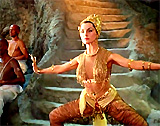
|
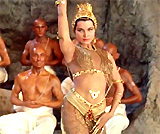
|
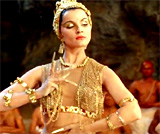
|

|
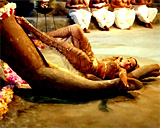
|

|
- in the second film (see right panel), Seetha performed
a second time - a sexy, mesmerizing, sinuous, near-naked (stripteasing),
exotic temple dance (in a three-piece, glued-on, strategically-placed,
scanty jewel-encrusted white bikini) to prove her innocence before
temple priests in a cave - again directly in front of Shiva - the
enormous, half-naked stone temple goddess; the snake dance began
when Seetha moved her hands from inside her blue robe, in front
of a gigantic hooded cobra (obviously fake) - pretending them to
be snake heads, with two green rings (snake eyes) on each of her
hands; after discarding her robe, she attempted to provocatively
charm the ropy, long phallic-shaped creature with her entrancing
dance; at the conclusion of her dance, she tripped and before being
bitten by the disapproving cobra, Chandra stepped in and crushed
the snake
|




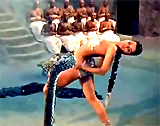

The Indian Tomb (1959, W. Germ/Fr./It.)
Second Film Dance Sequence
|








